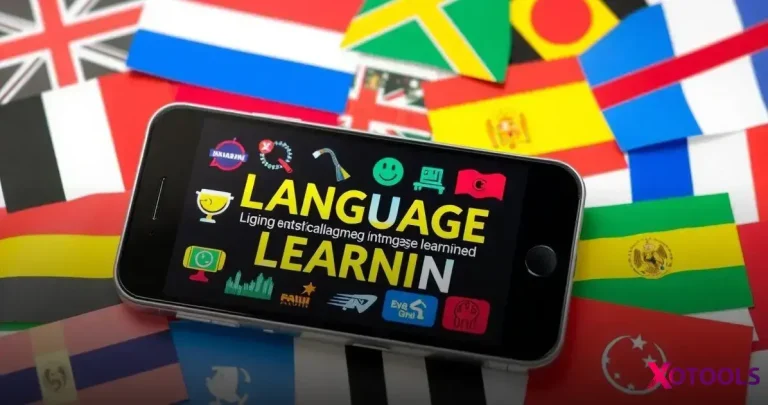ADVERTISEMENT
Language Learning Apps have transformed the way people pick up new languages. From quick lessons to interactive games, these tools make learning accessible and fun for everyone.
Whether you’re starting with the basics or looking to polish advanced skills, the right app can fit seamlessly into your daily routine. You can practice anywhere, anytime, without the pressure of a traditional classroom.
Curious about which apps really deliver results and keep learning enjoyable? Keep reading to discover top picks and tips that can help you level up your language skills.
Top Language Learning Apps Reviewed
When it comes to learning a new language, not all apps are created equal. Duolingo stands out as one of the most popular language learning apps. It makes learning fun with games and points. Whether you want to learn Spanish, French, or even Japanese, Duolingo has got you covered.
Another great choice is Babbel, which focuses on real-life conversations. The app is designed for adults and teaches practical phrases that you can use right away. With Babbel, lessons are short, so you can easily fit them into your busy day.
If you’re looking for something more advanced, check out Rosetta Stone. This app uses an immersive approach to teach languages, helping you think directly in the new language. It’s great for users who want to dive deep into pronunciation and grammar.
Benefits of Using Language Learning Apps
Using language learning apps offers many flexibility and convenience. You can learn at your own pace and choose the time that works best for you. Whether you have a few minutes during your lunch break or a longer session at home, these apps fit easily into your life.
Another great benefit is that language learning apps make practice fun. Many include games, quizzes, and challenges that keep you engaged. This way, learning feels less like a chore and more like an enjoyable activity. You can track your progress and celebrate small wins as you improve.
Lastly, these apps often provide access to a variety of languages. You can explore popular languages like Spanish and French, or even lesser-known ones like Swahili or Gaelic. This opens up new interests and allows you to dive into different cultures from the comfort of your home.
How to Choose the Right Language Learning App

Choosing the right language learning app can be exciting but a bit tricky. First, think about your goals. Do you want to learn for travel, business, or fun? Knowing your purpose will help narrow down the options. Some apps are great for beginners, while others focus on advanced learners.
Next, look at the features of each app. Some apps use games to make learning fun, while others focus on grammar and vocabulary. Try out a few free versions to see which one resonates with you. The right app should keep you engaged and motivated.
Finally, check for user reviews and ratings. Feedback from real users can give you valuable insights into how effective and user-friendly an app is. Apps that have good ratings and helpful comments are often worth a try. Trusting the experiences of others can guide you to make the best choice.
Best Apps for Beginners in Language Learning
For beginners in language learning, Duolingo is a fantastic choice. This app uses a fun and interactive approach to teach languages. With bite-sized lessons and engaging exercises, it makes learning enjoyable. You can learn vocabulary and grammar without feeling overwhelmed!
Another great app for beginners is Busuu. Busuu offers courses in multiple languages and includes a community feature. This lets you practice with native speakers, which can help you build confidence as you learn. The structured lessons are easy to follow, making it perfect for those just starting.
Finally, consider Memrise, which focuses on helping you remember words through fun videos and games. The app uses spaced repetition to help reinforce what you’ve learned. With its lively design and engaging content, Memrise keeps beginners motivated and excited about learning a new language.
Advanced Language Learning Apps You Should Try
If you’re looking to advance your language skills, consider using Babbel. This app offers in-depth lessons that focus on real-life conversations. Babbel’s courses are designed by language experts, making sure that each lesson is practical and relevant to everyday situations. Its speech recognition feature helps you improve your pronunciation as you practice.
Another excellent option is Pimsleur. This app emphasizes auditory learning, which is perfect for developing listening and speaking skills. Pimsleur provides lessons that you can listen to anywhere, making language practice easy to fit into your day. You’ll learn to think in the new language and respond naturally.
Lastly, check out LingQ. This app allows you to read and listen to real content in your target language, such as articles and audiobooks. LingQ helps you learn vocabulary in context, making it easier to remember. This immersive approach is great for advanced learners who want to challenge themselves and understand the language at a deeper level.
Language Learning Apps vs Traditional Learning

Language learning apps offer great flexibility compared to traditional learning methods. You can learn anytime and anywhere, which fits easily into busy schedules. With apps, you can customize your learning experience by choosing topics that interest you, making it easier to stay motivated and engaged.
On the other hand, traditional learning provides structured lessons with a teacher. This can be beneficial for understanding complex grammar rules and getting instant feedback. In a classroom, you can practice speaking with classmates, which helps improve your conversation skills and build confidence.
However, language learning apps often use interactive features, like games and quizzes, to make learning fun. These elements can help with memorization and retention of new information. Traditional methods may lack this engagement, making it harder for some learners to stay focused and excited about their studies.
How to Make the Most of Language Learning Apps
To make the most of language learning apps, set clear goals for your learning. Decide what you want to achieve, like mastering basic conversation skills or expanding your vocabulary. Having specific goals helps you stay focused and motivated while using the app.
Another way to enhance your experience is to practice regularly. Consistency is key in language learning. Try to dedicate a small amount of time each day to practice with the app. This could be as simple as completing a lesson or playing a quick game to reinforce what you’ve learned.
Finally, engage with native content to boost your learning. Use the app features that allow you to listen to real conversations or read articles in your target language. This will expose you to natural language use and improve your listening and reading skills.
Future Trends in Language Learning Apps
One exciting trend in language learning apps is the use of artificial intelligence. AI can personalize learning experiences by adapting lessons to fit each user’s skill level and learning pace. This means the app can understand what you struggle with and provide extra help in those areas.
Another trend is the rise of virtual reality (VR) and augmented reality (AR) in language learning. These technologies create immersive environments where users can practice speaking and listening in real-life situations. For example, you might find yourself on a virtual street in Paris, ordering a meal in French!
Finally, we can expect to see more community features in language apps. Users will be able to connect with each other to practice speaking and ask questions. Built-in community forums can assist learners with tips and resources, making the process more interactive and supportive.







